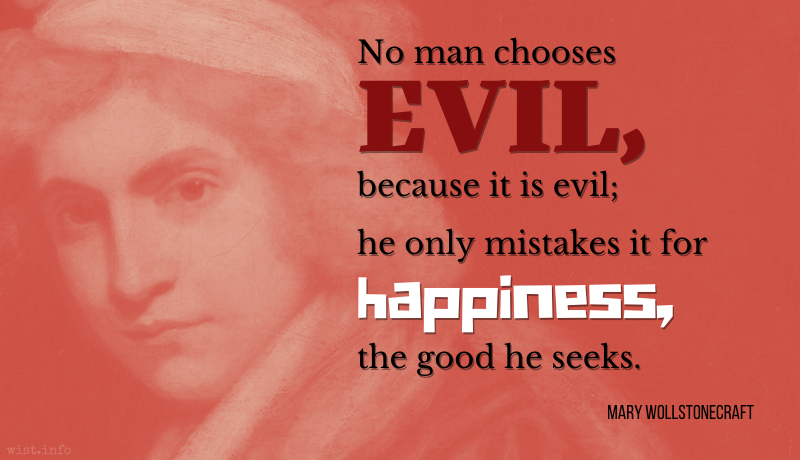Few people remember having been young, and how hard they found it to be chaste and sober.
[Peu de gens se souviennent d’avoir été jeunes, et combien il leur était difficile d’être chastes et tempérants.]
Jean de La Bruyère (1645-1696) French essayist, moralist
The Characters [Les Caractères], ch. 11 “Of Mankind [De l’Homme],” § 112 (11.112) (1688) [tr. Stewart (1970)]
(Source)
(Source (French)). Alternate translations:
Few people remember that they have been young, and how hard it was then to live chaste and temperate.
[Bullord ed. (1696)]
Few People remember they have been Young, and how hard it was then to live Chaste and Temperate.
[Curll ed. (1713)]
Few remember that they have been young, and how hard it was then to live chaste and temperate.
[Browne ed. (1752)]
Few men remember that they have been young, and how hard it was then to live chaste and temperate.
[tr. Van Laun (1885)]
Quotations about:
perspective
Note not all quotations have been tagged, so Search may find additional quotes on this topic.
For the world is not to be narrowed till it will go into the understanding (which has been done hitherto), but the understanding to be expanded and opened till it can take in the image of the world, as it is in fact.
[Neque enim arctandus est mundus ad angustias intellectus (quod adhue factum est), sed expandendus intellectus et laxandus ad mundi imaginem recipiendam, qualis invenitur.]
Francis Bacon (1561-1626) English philosopher, scientist, author, statesman
The Great Instauration, “Parsceve ad Historiam,” “Aphorisms on the Composition of the Primary History,” #4 (1620)
(Source)
Not anything is more responsible for the good old days than the fact that the grownups of one generation always remember the world as it looked to them in their young days, not as it looked to their elders.
Marcelene Cox (1900-1998) American writer, columnist, aphorist
“Ask Any Woman” column, Ladies’ Home Journal (1960-05)
(Source)
The difference between narcissism and self-love is a matter of depth. Narcissus falls in love not with the self, but with an image or reflection of the self — with the persona, the mask. The narcissist sees himself through the eyes of another, changes his lifestyle to conform with what is admired by others, tailors his behavior and expression of feelings to what will please others. Narcissism is eye trouble, voluntary blindness, an agreement to keep up appearances (hence the importance of “style”) and not to look beneath the surface.
Sam Keen (b. 1931) American author, professor, philosopher
The Passionate Life, ch. 8 (1983)
(Source)
A book read by a thousand different people is a thousand different books.
Andrei Tarkovsky (1932-1986) Russian film director, screenwriter, film theorist [Андрей Арсеньевич Тарковский]
Sculpting in Time (1986) [tr. Hunter-Blair]
(Source)
A clever speaker can speak on any
subject, either for or against.[ἐκ παντὸς ἄν τις πράγµατος δισσῶν λόγων
ἀγῶνα θεῖτ᾽ἄν, εἰ λέγειν εἴη σοφός.]Euripides (485?-406? BC) Greek tragic dramatist
Antiope [Αντιοπη], frag. 189 (TGF, Kannicht) [Chorus] (c. 410 BC)
(Source)
Barnes frag. 79, Musgrave 39. (Source (Greek)). Alternate translations:
The skillful orator can either side
Maintain on every topic of debate.
[tr. Wodhall (1809)]
A man could make an argument for two sides of any
matter, if he were a clever speaker.
[tr. Will (2015)]
An awareness of our smallness may help to redeem us from the arrogance which is the besetting sin of the scientists.
Freeman Dyson (1923-2020) English-American theoretical physicist, mathematician, futurist
Infinite in All Directions, Part 1, ch. 1 “In Praise of Diversity” (1988)
(Source)
Based on a lecture on "Science and Religion," National Conference of Catholic Bishops, Detroit (Sep 1986).
If it makes you more comfortable, you could simply think of it as a metaphor. Religions are, by definition, metaphors, after all: God is a dream, a hope, a woman, an ironist, a father, a city, a house of many rooms, a watchmaker who left his prize chronometer in the desert, someone who loves you — even, perhaps, against all evidence, a celestial being whose only interest is to make sure your football team, army, business, or marriage thrives, prospers and triumphs over all opposition.
Religions are places to stand and look and act, vantage points from which to view the world.
Neil Gaiman (b. 1960) British author, screenwriter, fabulist
American Gods, Part 3, ch. 18 (2001)
(Source)
Things look different when seen in a different light. So look at them in the light of happiness. Don’t confuse good and bad.
[Hace muy diferentes visos una misma cosa si se mira a diferentes luces: mírese por la de la felicidad. No se han de trocar los frenos al bien y al mal.]
Baltasar Gracián y Morales (1601-1658) Spanish Jesuit priest, writer, philosopher
The Art of Worldly Wisdom [Oráculo Manual y Arte de Prudencia], § 224 (1647) [tr. Maurer (1992)]
(Source)
(Source (Spanish)). Alternate translations:
One and the same thing, hath its good day, and its bad. Examine it on the fairest side. We must not give the contrary reines to good and evil.
[Flesher ed. (1685)]
The same thing looks quite different in another light; look at it therefore on its best side and do not exchange good for evil.
[tr. Jacobs (1892)]
For one and the same thing has very different faces, as seen in different lights; look upon it in its happiest light, and do not get the controls mixed, as to what is good and what is bad.
[tr. Fischer (1937)]
Why is it that right-wing bastards always stand shoulder to shoulder in solidarity, while liberals fall out among themselves?
Yevgeny Yevtushenko (1933-2017) Russian poet, writer, film director, academic [Евге́ний Евтуше́нко, Evgenij Evtušenko]
In The Observer (15 Dec 1991)
(Source)
Sweet is the remembrance of troubles when you are in safety.
Euripides (485?-406? BC) Greek tragic dramatist
Andromeda [Ἀνδρομέδα], Frag. 131 (TGF) (412 BC)
(Source)
(Source (Greek)). Alternate translations:
'Tis sweet to recollect past toils in safety.
[tr. Wodhull (1809)]
Sweet is the memory of toils that are past.
[tr. Reid (1883), in Cicero, De Finibus, 2.105]
Sweet is the memory of sorrows past.
[tr. Rackham (1914), in Cicero, De Finibus, 2.105]
Your lady friends are ill to see,
All old or ugly as can be,
And in their company you go
To banquet, play, and portico;
This hideous background you prepare
To seem, by contrast, young and fair.[Omnes aut vetulas habes amicas
Aut turpes vetulisque foediores.
Has ducis comites trahisque tecum
Per convivia, porticus, theatra.
Sic formosa, Fabulla, sic puella es.]Martial (AD c.39-c.103) Spanish Roman poet, satirist, epigrammatist [Marcus Valerius Martialis]
Epigrams [Epigrammata], Book 8, epigram 79 (8.79) (AD 94) [tr. Pott & Wright (1921), “The Contrast”]
(Source)
"To Fabulla." (Source (Latin)). Alternate translations:
All thy companions aged beldames are,
Or more deform'd than age makes any, far:
These cattle at thy heels thou trail'st always
To public walks, to suppers, and to plays.
'Cause when with such alone we thee compare,
Thou canst be said, Fabulla, young or fair.
[tr. Killigrew (1695)]
All the companions of her grace, I'm told,
Are either very plan, or very old.
With these she visits: these she drags about,
To play, to ball, assembly, auctions, rout:
With these she sups: with these she takes the air.
Without such foils is lady dutchess fair?
[tr. Hay (1755)]
Old women are thine only friends;
Or rivals, safe as they.
No other face thy face attends,
To table, porch or play.
Fabulla, thus thou beauteous art,
And thus thou still art young.
Oh! solace to my eyes impart;
Or silence to my tongue.
[tr. Elphinston (1782), Book 6, Part 3, ep. 94]
All your female friends are either old or ugly; nay, more ugly than old women usually are. These you lead about in your train, and drag with you to feasts, porticoes, and theatres. Thus, Fabulla, you seem handsome, thus you seem young.
[tr. Bohn's Classical (1859)]
All the female friends you have are either old crones or ugly, and fouler than old crones. These, as your companions, you conduct and drag about with you through parties, colonnades, theaters. In this way, Fabulla, you are lovely, in this way young.
[tr. Ker (1919)]
The friends that old Fabulla owns
Are harridans and ancient crones,
Ill-favored witches, what you will;
These are her constant comrades still
To banquets, theatres, and shows;
So ever fair and young she goes.
[tr. Francis & Tatum (1924), ep. 442]
The only female friends she has
Are old or ugly crows.
These she drags along with her
To parties, visits, shows.
So it's no cause for wonder that
Amidst such company
She's young, attractive, beautiful --
Almost a joy to see!
[tr. Marcellino (1968)]
Her women friends are all old hags
Or, worse, hideous girls. She drags
Them with her everywhere she goes --
To parties, theaters, porticoes.
Clever Fabulla! Set among
Those foils you shine, even look young.
[tr. Michie (1972)]
All your women friends are either old hags or frights uglier than old hags. These are your companions whom you bring with you and trail through dinner parties, colonnades, theaters. In this way, Fabullla, you are a beauty, you are a girl.
[tr. Shackleton Bailey (1993)]
With women you keep company
Who are ugly as can be.
These ancient frights you take along
To show off in your social throng.
You hope that we will make compare,
So even you look young and fair.
[tr. Wills (2007)]
All your friends are ancient hags
or eyesores uglier than those.
These are the company you drag
to banquets, plays, and porticoes.
Fabulla, when you're seen among
such friends, you're beautiful and young.
[tr. McLean (2014)]
The vulgar are never really happy with their luck, even when it is best, or unhappy with their intellect, even when it is worst.
[Vulgaridad es no estar contento ninguno con su suerte, aun la mayor, ni descontento de su ingenio, aunque el peor.]
Baltasar Gracián y Morales (1601-1658) Spanish Jesuit priest, writer, philosopher
The Art of Worldly Wisdom [Oráculo Manual y Arte de Prudencia], § 209 (1647) [tr. Maurer (1992)]
(Source)
Gracian frames this as an old saying. (Source (Spanish)). Alternate translations:
No man is content with his own condition, though it be the best: nor dissatisfied with his wit, though it be the worst.
[Flesher ed. (1685)]
... the common prejudice that any one is satisfied with his fortune, however great, or unsatisfied with his intellect, however poor it is.
[tr. Jacobs (1892)]
None is content with his fortune even though the best, and none is discontented with his mind, even though the worst.
[tr. Fischer (1937)]
The river of truth is always splitting up into arms that reunite. Islanded between them, the inhabitants argue for a lifetime as to which is the mainstream.
Cyril Connolly (1903-1974) English intellectual, literary critic and writer.
The Unquiet Grave, Part 3 “La Clé des Chants” (1944)
(Source)
Often misquoted:
Truth is a river that is always splitting up into arms that reunite. Islanded between the arms, the inhabitants argue for a lifetime as to which is the main river.
We must constantly look at things in a different way. […] Just when you think you know something, you must look at it in a different way. Even though it may seem silly or wrong, you must try. […] Dare to strike out and find new ground.
Humility makes us charitable toward our neighbor. Nothing will make us so generous and merciful to the faults of others as seeing our own faults.
François Fénelon (1651-1715) French theologian, poet, writer [François de Salignac de la Mothe-Fénelon]
Letter, Undated [tr. Edmonson / Helms]
(Source)
In Robert J. Edmonson, Hal M. Helms (eds.), The Complete Fénelon, Part 2, ch. 8 (2008). Alternate translations:
Nothing will make us so charitable and tender to the faults of others as by self-examination thoroughly to know our own.
[Source (1895)]
Humility renders us charitable towards our neighbor; nothing will make us so tender and indulgent to the faults of others as a view of our own.
[tr. Metcalf (1853)]
The people who say you are not facing reality actually mean that you are not facing their idea of reality. Reality is above all else a variable, and nobody is qualified to say that he or she knows exactly what it is. As a matter of fact, with a firm enough commitment, you can sometimes create a reality which did not exist before. Protestantism itself is proof of that.
It is very easy for you to call me a happy man: you are only a spectator. I am one of the principals; and I know better.
George Bernard Shaw (1856-1950) British playwright and critic
Man and Superman, Act 4 [Tanner] (1903)
(Source)
When, Miller wondered, does someone stop being human? There had to be a moment, some decision that you made and before it, you were one person, and after it, someone else …Emotionally, it had all been obvious at the time. It was only when he considered it from outside that it seemed dangerous. If he’d seen it in someone else — Muss, Havelock, Sematimba — he wouldn’t have taken more than a minute to realize they’d gone off the rails. Since it was him, he had taken longer to notice. But Holden was right. Somewhere along the line, he’d lost himself.
Daniel Abraham (b. 1969) American writer [pseud. James S. A. Corey (with Ty Franck), M. L. N. Hanover]
Leviathan Wakes, ch. 28 (2011) [with Ty Franck]
(Source)
You are not a human being having a spiritual experience. You are a spiritual being having a human experience.
Wayne Dyer (1940-2015) American self-help author, motivational speaker
You’ll See It When You Believe It: The Way to Your Personal Transformation, ch. 2, epigraph (1989)
(Source)
A variant of the phrase is also included in the Introduction to the book: "That you are not a human being having a spiritual experience, but rather a spiritual being having a human experience."
Dyer originally used a variation of this ("Can you see yourselves as spiritual beings having a human experience, rather than human beings who may be having a spiritual experience?") the previous year in "A Letter to the Next Generation," an advertisement by Volkswagen.
Also attributed, without citation to Pierre Teilhard de Chardin (incorrectly) and Georges I. Gurdjieff.
More discussion: You Are Not a Human Being Having a Spiritual Experience. You Are a Spiritual Being Having a Human Experience – Quote Investigator.
“Some people say we shouldn’t give alms to the poor, Shirley.”
“They are great fools for their pains. For those who are not hungry, it is easy to palaver about the degradation of charity, and so on; but they forget the brevity of life, as well as its bitterness. We have none of us long to live: let us help each other through seasons of want and woe, as well as we can, without heeding in the least the scruples of vain philosophy.”
Charlotte Brontë (1816-1855) British novelist [pseud. Currer Bell]
Shirley, ch. 14 [Lina and Shirley] (1849)
(Source)
To arrive at a just estimate of a renowned man’s character one must judge it by the standards of his time, not ours. Judged by the standards of one century, the noblest characters of an earlier one lose much of their luster; judged by the standards of today, there is probably no illustrious man of four or five centuries ago whose character could meet the test at all points.
Mark Twain (1835-1910) American writer [pseud. of Samuel Clemens]
Joan of Arc, “Translator’s Preface” (1860)
(Source)
You will always find some Eskimos ready to instruct the Congolese on how to cope with heat waves.
Stanislaw Lec (1909-1966) Polish aphorist, poet, satirist
Unkempt Thoughts [Myśli nieuczesane] (1957) [tr. Gałązka (1962)]
(Source)
Unless one is raised in the minion mindset, it is difficult to understand the allure of the lifestyle. Outside observers merely see put-upon underlings who live and work in insanely dangerous positions, whose lives are ruled by dictatorial psychopaths who have little regard for their lives or sanity. Acclimatized minions realize that everyone on Earth lives under these strictures, they just don’t fool themselves. With clarity comes freedom.
Phil Foglio (b. 1956) American writer, cartoonist
Agatha H and the Voice of the Castle (2014) [with Kaja Foglio]
(Source)
Man lives, not directly or nakedly in nature like the animals, but within a mythological universe, a body of assumptions and beliefs developed from his existential concerns.
Northrop Frye (1912-1991) Canadian literary critic and literary theorist
The Great Code: The Bible and Literature, Introduction (1982)
(Source)
The young know how old age should be; the old how youth should have been.
Paul Eldridge (1888-1982) American educator, novelist, poet
Maxims for a Modern Man, #139 (1965)
(Source)
Many owe their greatness to their enemies. Flattery is fiercer than hatred, for hatred corrects the faults flattery had disguised. The prudent man makes a mirror out of the evil eye of others; it is more truthful than that of affection, and helps him reduce his defects or emend them.
[Fabricáronles a muchos su grandeza sus malévolos. Más fiera es la lisonja que el odio, pues remedia este eficazmente las tachas que aquella disimula. Hace el cuerdo espejo de la ojeriza, más fiel que el de la afición, y previene a la detracción los defectos, o los enmienda.]
Baltasar Gracián y Morales (1601-1658) Spanish Jesuit priest, writer, philosopher
The Art of Worldly Wisdom [Oráculo Manual y Arte de Prudencia], § 84 (1647) [tr. Maurer (1992)]
(Source)
(Source (Spanish)). Alternate translations:
Many owe their fortune to their enviers. Flattery is more cruel than ha∣tred, in as much as it palliates the faults, which the other makes us remedy. The wise man makes the hatred of his Enviers his looking-glass, wherein he sees himself far better than in that of kindness.
[Flesher ed. (1685)]
Many have had their greatness made for them by their enemies. Flattery is more dangerous than hatred, because it covers the stains which the other causes to be wiped out. The wise will turn ill-will into a mirror more faithful than that of kindness, and remove or improve the faults referred to.
[tr. Jacobs (1892)]
Many have been made through the greatness of their enemies. Far more to be feared is flattery, than hate, since this exposes the flaws, which flattery would conceal. The man who knows makes a mirror of spite, more faithful than the mirror of affection, and envisages his shortcomings, to correct them.
[tr. Fischer (1937)]
Lift up your hearts!
No more complaint and fear! It well may be
some happier hour will find this memory fair.[Revocate animos, maestumque timorem
mittite: forsan et haec olim meminisse iuvabit.]Virgil (70-19 BC) Roman poet [b. Publius Vergilius Maro; also Vergil]
The Aeneid [Ænē̆is], Book 1, l. 202ff (1.202-203) (29-19 BC) [tr. Williams (1910)]
(Source)
(Source (Latin)). Alternate translations:
Courage recall, banish sad feare; delight
It may hereafter these things to recite,
[tr. Ogilby (1649)]
Resume your courage and dismiss your care.
An hour will come, with pleasure to relate
Your sorrows past, as benefits of Fate.
[tr. Dryden (1697)]
Resume then your courage, and dismiss your desponding fears; perhaps hereafter it may delight you to remember these sufferings.
[tr. Davidson/Buckley (1854)]
Come, cheer your souls, your fears forget;
This suffering will yield us yet
A pleasant tale to tell.
[tr. Conington (1866)]
Recall your courage ; banish gloomy fears.
Some day perhaps the memory even of these
Shall yield delight.
[tr. Cranch (1872)]
Recall your courage, put dull fear away. This too sometime we shall haply remember with delight.
[tr. Mackail (1885)]
Come, call aback your ancient hearts and put your fears away!
This too shall be for joy to you remembered on a day.
[tr. Morris (1900)]
Fear not; take heart; hereafter, it may be
These too will yield a pleasant tale to tell.
[tr. Taylor (1907)]
Recall your courage and put away sad fear. Perchance even this distress it will some day be a joy to recall.
[tr. Fairclough (1916)]
Call the nerve back; dismiss the fear, the sadness.
Some day, perhaps, remembering even this
Will be a pleasure.
[tr. Humphries (1951)]
Take heart again, oh, put your dismal fears away!
One day -- who knows? -- even these will be grand things to look back on.
[tr. Day Lewis (1952)]
Call back
your courage, send away your grieving fear.
Perhaps one day you will remember even
these our adversities with pleasure.
[tr. Mandelbaum (1971), l. 281ff]
Now call back
Your courage, and have done with fear and sorrow.
Some day, perhaps, remembering even this
Will be a pleasure.
[tr. Fitzgerald (1981), l. 275ff]
So summon up your courage once again. This is no time for gloom or fear. The day will come, perhaps, when it will give you pleasure to remember even this.
[tr. West (1990)]
Remember your courage and chase away gloomy fears:
perhaps one day you’ll even delight in remembering this.
[tr. Kline (2002)]
Recall your courage
And put aside your fear and grief. Someday, perhaps,
It will help to remember these troubles as well.
[tr. Lombardo (2005), l. 238ff]
Call up your courage again. Dismiss your grief and fear.
A joy it will be one day, perhaps, to remember even this.
[tr. Fagles (2006)]
Perhaps one day it will be a joy to remember also these things.
[tr. @sentantiq (2011)]
Summon your spirits back, and abandon your sad fear:
perhaps one day even these things will be a pleasing memory.
[tr. @sentantiq/Robinson (2015)]
Perhaps one day it will be a joy to remember even these things
[tr. @sentantiq (2016)]
One day we’re going to look back on even this and laugh (maybe).
[tr. Tortorelli (2017)]
Perhaps someday it will bring pleasure to recall these things.
[tr. @sentantiq (2020)]
Be brave, let go your fear and despair.
Perhaps someday even memory of this will bring you pleasure.
[tr. Bartsch (2021)]
Commentary on this passage: A Hope for Better Days to Come – SENTENTIAE ANTIQUAE.
Of course, when stood next to the choice of American political parties (“So, would you like Right Wing, or Supersized Right Wing with Extra Fries?”) my English fuzzy middle-of-the-roadness probably translates easily as bomb-throwing Trotskyist, but when I get to chat to proper lefties like Ken MacLeod or China Mieville I feel myself retreating rapidly back into the woffly Guardian-reading why-can’t-people-just-be-nice-to-each-otherhood of the politically out of his depth.
Neil Gaiman (b. 1960) British author, screenwriter, fabulist
Blog entry (2003-06-15), “Walking Down the Street Naked, Possibly with a Mullet”
(Source)
When asked whether (and denying) he is a Communist.
There are two cinemas: the films we have actually seen and the memories we have of them. The gap between the two widens over the years.
Molly Haskell (b. 1939) American feminist film critic and author.
From Reverence to Rape: The Treatment of Women in the Movies (3rd ed, 2016; orig 1973)
(Source)
Love unlocks doors and opens windows that weren’t even there before.
Mignon McLaughlin (1913-1983) American journalist and author
The Second Neurotic’s Notebook, ch. 1 (1966)
(Source)
Contumely always falls upon those who break through some custom or convention. Such men, in fact, are called criminals. Everyone who overthrows an existing law is, at the start, regarded as a wicket man. Long afterward, when it is found that this law was bad and so cannot be re-established, the epithet is changed. All history treats almost exclusively of wicked men who, in the course of time, have come to be looked upon as good men. All progress is the result of successful crimes.
Friedrich Nietzsche (1844-1900) German philosopher and poet
The Dawn [Morgenröte], sec. 20 (1881) [Mencken (1907)]
(Source)
Alternate translations:
We have to make good a great deal of the contumely which has fallen on all those who, by their actions, have broken through the conventionality of some custom -- such people generally have been called criminals. Everybody who overthrew the existing moral law has hitherto, at least in the beginning, been considered a wicked man; but when afterwards, as sometimes happened, the old law could not be re-established and had to be abandoned, the epithet was gradually changed. History almost exclusively treats of such wicked men who, in the course of time, have been declared good men.
[tr. Volz (1903)]
One has to take back much of the defamation which people have cast upon all those who broke through the spell of a custom by means of a deed -- in general, they are called criminals. Whoever has overthrown an existing law of custom has hitherto always first been accounted a bad man: but when, as did happen the laws could not afterwards be reinstated and this fact was accepted, the predicate gradually changed -- history treats almost exclusively of these bad men who subsequently became good men!
[tr. Hollingdale (1997)]
History is not a catalogue but a version of events … a convincing version of events. If an historian is any good, he is convinced by his own version of events and then tries to put this conviction across.
A. J. P. Taylor (1906-1990) British historian, journalist, broadcaster [Alan John Percivale Taylor]
“The view from Twisden Rd.”, interview by Duncan Fallowell, The Spectator (28 May 1983)
(Source)
It may be confidently asserted that no man chooses evil, because it is evil; he only mistakes it for happiness, the good he seeks.
Mary Wollstonecraft (1759-1797) English social philosopher, feminist, writer
A Vindication of the Rights of Men (1790)
(Source)
The problem is, many of the people in need of saving are in churches, and at least part of what they need saving from is the idea that God sees the world the same way they do.
Barbara Brown Taylor (b. 1951) American minister, academic, author
An Altar in the World, ch. 2 (2009)
(Source)
The past, which as always did not know the future, acted in ways that ask to be imagined before they are condemned. Or even simplified.
People may see hypocrisy and cynicism all around them, but in my experience, almost without exception, they believe their own views and actions — even when contradictory, even when private motivations differ from public explanations — are righteous and principled.
John F. Harris (b. c. 1963) American political journalist, editor
“‘He Is Our O.J.'” Politico (9 Jan 2020)
(Source)
It is important to remember that events now long in the past were once in the future.
F. W. Maitland (1850-1906) English legal historian and jurist [Frederic William Maitland]
(Attributed)
A favorite saying of A. J. P. Taylor's which he used repeatedly in his writings, attributing it to Maitland. It is sometimes erroneously attributed to Taylor. Variant: "It is very had to remember that events now long in the past were once in the future"
Perhaps the hardest thing for humans to do is to imagine the world as it is imagined by others. We tend to confuse acting in accordance with the goals and values of the society in which we live with rationality; we tend to confuse intelligence with thinking in accordance with those goals and values. And, of course, we are always inclined to see events as predetermined — and we are almost always wrong.
Masha Gessen (b. 1967) Russian-American journalist, author, translator, activist
“The Fundamental Uncertainty of Mueller’s Russia Indictments,” The New Yorker (20 Feb 2018)
(Source)
Little girls are cute and small only to adults. To one another they are not cute. They are life-sized.
Margaret Atwood (b. 1939) Canadian writer, literary critic, environmental activist
Cat’s Eye, ch. 22 (1988)
(Source)
The present enables us to understand the past, not the other way round.
A. J. P. Taylor (1906-1990) British historian, journalist, broadcaster [Alan John Percivale Taylor]
“The Radical Tradition: Fox, Paine, and Cobbett,” The Trouble Makers: Dissent over Foreign Policy, 1792-1939 (1969)
(Source)
People in other cultures are generally thought to commit terrible acts for calculated reasons, underscored by some perverse morality that can be readily discounted, so that only the consequences of their actions should be judged, whereas for one’s own group motivation is, and what ought to, mostly count.
Scott Atran (b. 1952) American-French cultural anthropologist
“Good Guys Kill Better,” Huffington Post (17 Mar 2012)
(Source)
Why does truth call forth hatred? Simply because truth is loved in such a way that those who love some other thing want it to be the truth, and precisely because they do not wish to be deceived, are unwilling to be convinced that they are indeed being deceived. Thus they hate the truth for the sake of that other thing which they love, because they take it for the truth. They love truth when it enlightens them, they hate it when it accuses them.
[Cur autem veritas parit odium et inimicus eis factus est homo tuus verum praedicans, cum ametur beata vita, quae non est nisi gaudium de veritate, nisi quia sic amatur veritas ut, quicumque aliud amant, hoc quod amant velint esse veritatem, et quia falli nollent, nolunt convinci quod falsi sint? Itaque propter eam rem oderunt veritatem, quam pro veritate amant. Amant eam lucentem, oderunt eam redarguentem.]
Augustine of Hippo (354-430) Christian church father, philosopher, saint [b. Aurelius Augustinus]
Confessions, Book 10, ch. 23 / ¶ 34 (10.23.34) (c. AD 398) [tr. Boulding (1997)]
(Source)
(Source (Latin)). Alternate translations:
But why doth "truth generate hatred," and the man of thine, preaching the truth, become an enemy to them? Whereas a happy life is loved, which is nothing else but joying in the truth; unless that truth is in that kind loved, that they who love any thing else would gladly have that which they love to be the truth: and because they would not be deceived, would not be convinced that they are do? Therefore do they hate the truth for that thing's sake which they love instead of the truth. They love truth when she enlightens, they hate her when she reproves.
[tr. Pusey (1838)]
Why, then, doth truth beget hatred, and that man of thine, preaching the truth, became an enemy unto them, whereas a happy life is loved, which is naught else but joy in the truth; unless that truth is loved in such a sort as that those who love aught else wish that to be the truth which they love, and, as they are willing to be deceived, are unwilling to be convinced that they are so? Therefore do they hate the truth for the sake of that thing which they love instead of the truth. They love the truth when she shines on them, and hate her when she rebukes them.
[tr. Pilkington (1876)]
But why does "truth beget hatred," and why is that man of Thine, preaching the truth, made an enemy to them, whereas a happy life is loved, which is nothing else joy in the truth; unless the truth is so loved, that whoever loves something else, wants that which they love to be the truth, and because they are unwilling to be deceived, are unwilling to be convinced that they are imposed on? Therefore do they hate the truth, for the sake of that thing which they love instead of it. They love truth when it shines; hate it when it rebukes.
[tr. Hutchings (1890)]
Why does truth call forth hatred? Why is Your servant treated as an enemy by those to whom he preaches the truth, if happiness is loved, which is simply joy in truth? Simply because truth is loved in such a way that those who love some other thing want it to be the truth, and, precisely because they do not wish to be deceived, are unwilling to be convinced that they are deceived. Thus they hate the truth for the sake of that other thing which they love because they take it for truth. They love truth when it enlightens them, they hate truth when it accuses them.
[tr. Sheed (1943)]
Why, then, does truth generate hatred, and why does thy servant who preaches the truth come to be an enemy to them who also love the happy life, which is nothing else than joy in the truth -- unless it be that truth is loved in such a way that those who love something else besides her wish that to be the truth which they do love. Since they are unwilling to be deceived, they are unwilling to be convinced that they have been deceived. Therefore, they hate the truth for the sake of whatever it is that they love in place of the truth. They love truth when she shines on them; and hate her when she rebukes them.
[tr. Outler (1955)]
Why is it, then, that “truth begets hatred?” Why is your man who preaches truth to men become an enemy in their eyes, even though there is love for the happy life, which is naught else but joy in the truth? Can such things be except because truth is loved in such wise that men who love some other object want what they love to be the truth, and because they do not want to be deceived, they refuse to be convinced that they have been deceived? Therefore, they hate the truth for the sake of that very thing which they have loved instead of the truth. They love the truth because it brings light to them; they hate it in as much as it reproves them.
[tr. Ryan (1960)]
But why does truth engender hatred? Why does your servant meet with hostility when he preaches the truth, although men love happiness, which is simply the enjoyment of truth? It can only be that man’s love of truth is such that when he loves something which is not the truth, he pretends to himself that what he loves is the truth, and because he hates to be proved wrong, he will not allow himself to be convinced that he is deceiving himself. So he hates the real truth for the sake of what he takes to his heart in its place. Men love the truth when it bathes them in its light: they hate it when it proves them wrong.
[tr. Pine-Coffin (1961)]
But why is it that “truth gives birth to hatred”? Why does your servant who preaches the truth incur enmity in spite of the fact that people love the happy life which simply is joy in truth? It is because truth is loved in such a way that those who love something else would like to believe that what they love is the truth, and because they would not like to be deceived, they object to being shown that in fact they are deceived. And so they hate truth for the sake of whatever it is they love instead of truth. They love the light of truth, but hate it when it shows them up as wrong.
[tr. Warner (1963)]
But why does truth engender hatred, and why does your man become an enemy to those to whom he preaches truth, though the blessed life is loved, which is nothing else but rejoicing because of the truth? Unless it be that truth is so” loved, that, whoever loves anything else wants what they love to be the truth, and because they do not wish to be deceived and are unwilling to be convinced that they are deceived. And so, for the sake of that which they love instead of the truth, they hate the truth. They love truth when it enlightens, hate it when it reproves.
[tr. Blaiklock (1983)]
So why, then, does truth sometimes engender hatred? Why does the servant of God come to be an enemy of those who want a happy life, even though true happiness is joy in the truth? The reason must be this: Our love of truth is such that when we love something that’s not the truth, we pretend to ourselves that we we love is the truth. Then, because we hate to be proved wrong, we’re unwilling to be convinced that we’ve deceived ourselves. In this way, then, people hate the truth for the sake of whatever it is that they love more than the truth. They love truth when it shines warmly on them, and hate it when it rebukes them.
[Source]
The same distinction marks off Tragedy from Comedy; for Comedy aims at representing men as worse, Tragedy as better than in actual life.
[ἐν αὐτῇ δὲ τῇ διαφορᾷ καὶ ἡ τραγῳδία πρὸς τὴν κωμῳδίαν διέστηκεν: ἡ μὲν γὰρ χείρους ἡ δὲ βελτίους μιμεῖσθαι βούλεται τῶν νῦν.]
Aristotle (384-322 BC) Greek philosopher
Poetics [Περὶ ποιητικῆς, De Poetica], ch. 2, sec. 4 / 1448a (c. 335 BC) [tr. Butcher (1895)]
(Source)
Original Greek. Alternate translations:
This difference it is that distinguishes Tragedy and Comedy also; the one would make its personages worse, and the other better, than the men of the present day.
[tr. Bywater (1909)]
Tragedy and Comedy are at the Poles: for the former means to portray a superior, the latter an inferior being to modern man.
[tr. Margoliouth (1911)]
It is just in this respect that tragedy differs from comedy. The latter sets out to represent people as worse than they are to-day, the former as better.
[tr. Fyfe (1932)]
Tragedy too is distinguished from comedy by precisely this difference; comedy prefers to represent people who are worse than those who exist, tragedy people who are better.
[tr. Janko (1987), 1.3]
And tragedy stands in the same relation of difference to comedy; for the one tends to take as subjects men worse than the general run, and the other takes men better than we are.
[tr. Whalley (1997)]
And by this very difference tragedy stands apart in relation to comedy, for the latter intends to imitate those who are worse, and the former better, than people are now.
[tr. Sachs (2006)]
The very same difference makes the distinction between tragedy and comedy: the latter aims to represent people as worse, and the former as better, than people nowadays are.
[tr. Kenny (2013)]
The history is right perhaps, but let us not forget, it was written by the victors.
[L’histoire est juste peut-être, mais qu’on ne l’oublie pas, elle a été écrite par les vainqueurs.]
Alexis Guignard, comte de Saint-Priest (1805-1851) French diplomat and historian
History of Royalty [Histoire de la Royauté] (1842)
(Source)
Two things have always been true about human beings. One, the world is always getting better. Two, the people living at that time think it’s getting worse. It’s because you get older, your responsibilities are different. Now I’m taking care of children instead of being a child. It makes the world look scarier. That happens to everyone.
Penn Jillette (b. 1955) American stage magician, actor, musician, author
“Honest Questions with Penn Jillette,” Interview by Glen Beck, CNN (2 Nov 2007)
(Source)
I believe that no endeavor that is worthwhile is simple in prospect; if it is right, it will be simple in retrospect.
Edward Teller (1908-2003) Hungarian-American theoretical physicist
Quoted by Judith Shoolery, personal communication (2004)
(Source)
Quoted in István Hargittai, The Martians of Science: Five Physicists Who Changed the Twentieth Century (2006).
But, however tardily, I nonetheless caught myself and realized I had always devoted my time and attention to people who fascinated me and were pleasant, who engaged my sympathy, and that as a result I was seeing society like the Moon, always from one side.
Alexander Solzhenitsen (1918-2008) Russian novelist, emigre [Aleksandr Isayevich Solzhenitsyn]
The Gulag Archipelago, Vol. 2 (1974) [tr. Whitney]
(Source)
No object is so ugly that, under certain conditions of light and shade, or proximity to other things, it will not look beautiful; no object is so beautiful that, under certain conditions, it will not look ugly.
Oscar Wilde (1854-1900) Irish poet, wit, dramatist
Lecture to Art Students, Royal Academy, London (30 Jun 1883)
(Source)
If all men were rich, all men would be poor.
Mark Twain (1835-1910) American writer [pseud. of Samuel Clemens]
Mark Twain’s Noteook (1935 ed) [ed. Paine]
(Source)

















































